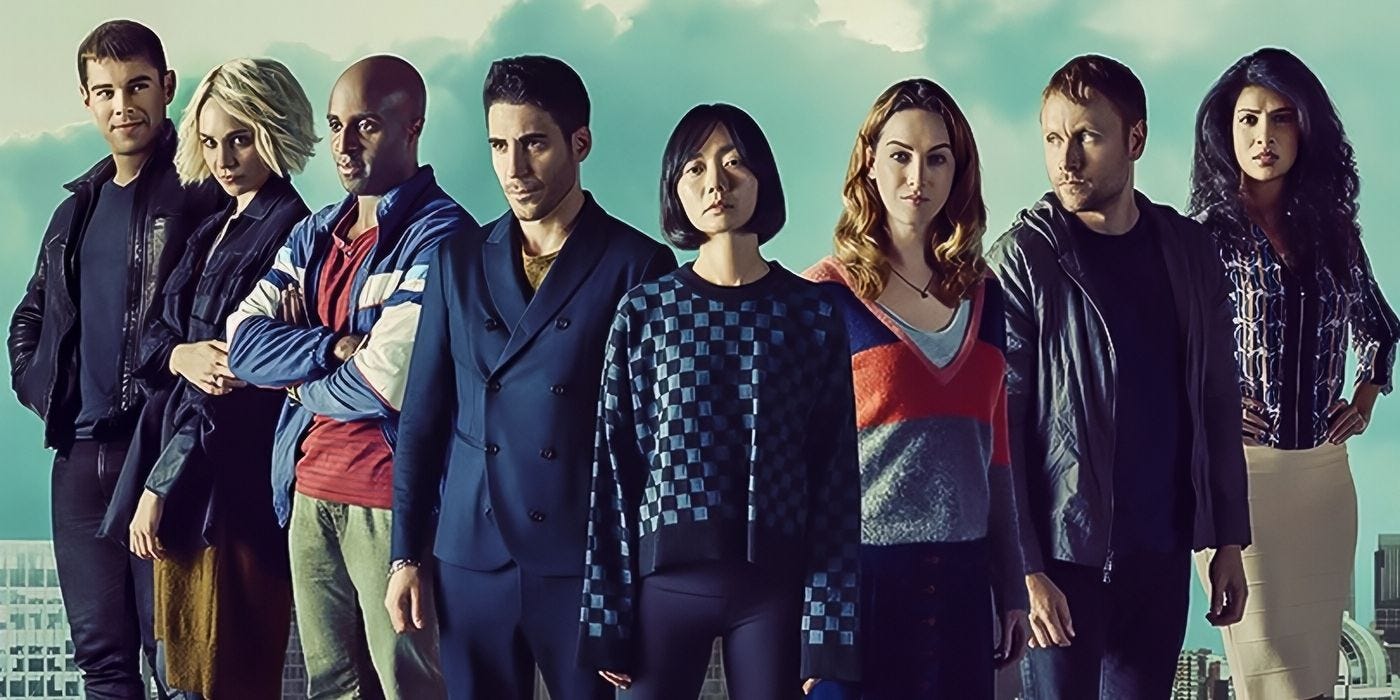I Am We
Looking back at Sense8 (2015-2018)
What always moves me about Sense8 is its central theme of empathy. The show's sci-fi concept revolves around individuals all over the world having a shared psychic connection. This connection allows them to share their lived experiences through mind and body. The concept is taken full advantage of with a wide diversity of characters. They share everything: emotions, visions, and physical sensations. The show begins with the characters going through a discovery process of their abilities. What their abilities as "sensates" lead to is the radical acceptance of each other and a heightened ability to tackle any obstacle they face. It leads to the increasing acceptance of themselves individually, with surprising (and often humorous) effects on their family and friends. What always brings me back to the show is the yearning for that same acceptance and the ability to share it with others. It's a very human desire, and the show isn't afraid to show just how messy it could be.
It really is one of the most bold explorations from the Wachowskis, with the help of writers: J. Michael Straczynski, David Mitchell, and Aleksandar Hemon. It wears its progressive view of inclusion on its sleeve, and it also provides a more intimate and direct expression of the Wachowskis' personal experiences as trans women. The sensate ability itself is a sci-fi expression of neurodivergence, an umbrella concept that allows for easy projection from anyone who’s ever felt like an outsider. What the main characters face over the entire series are high stakes that arise from attempts to persecute them for being who they are. These are themes that have been constant throughout the filmography of the Wachowskis.
Global scale, production complexity
The global scale of the production is highly ambitious and hard to fathom in Netflix's current era. The fact that Netflix was willing to invest in the production speaks to the more liberal and experimental processes of greenlighting shows in the 2010s. While the scale of the show is one of its greatest strengths, it also resulted in its undoing.
It isn't an effects or CGI heavy sci-fi, instead relying almost entirely on concept and practical effects for its action sequences. What results is an experience remarkably grounded and often times sensual. This allows for just the right variety of dramatic set-pieces without clashing with intimate conversation. With the choice to film on-location, different parts of the world are depicted to display the cultures of each character as authentically as possible. This sounds like a logistical nightmare, with actors being flown all over the world in order to physically appear in visitations with other sensates. It pays off on screen, as every performer is generous with their scene partner, leading to truly intimate and surreal relationships.
The audience can easily fill in the blanks of their sensates implied abilities when needed, without feeling as if being cheated by the promise of something more elaborate. The greatest joy is in watching the characters respond to their circumstances. When a sensate decides to help another in distress, the two are simultaneously experiencing the moment, allowing for fun back and forth banter between the characters. Their abilities also allow an actor to step into the shoes of another, showing where they excel in place of the other sensate. A clever trick, for intimate character development, is that we rarely see more than two sensates in a sequence at a time. For production purposes, it keeps things lean without making the scale feel too small. It also inspires unique relationship dynamics in the group that otherwise would get lost in ensemble sequences. Ensemble sequences feel much more special as a result. When all the sensates in a "cluster" are together, it usually means the stakes of their survival are high and a major story beat is underway.
Radical empathy in action
While there is plenty of action, the show is primarily a character drama. Deep background knowledge of every character is explored: upbringings, relationships, desires, fears. Every messy detail that is often exchanged in the closest of relationships, is put on full display. It’s the moments when a character is vulnerable and willing to talk about how the past shaped them, that makes the show special. The most notable of these sequences is had between the characters of Naomi (Jamie Clayton) and Lito (Miguel Ángel Silvestre):
This sequence truly embodies the heart of the show. My first time watching it, these moments provided a cathartic space of being unapologetically heard, a space I needed at that time. That is part of the reason why the cancellation stung so much. It’s a feeling that resonates with fans of the show so much, that we managed one of the few successful campaigns to get the show the conclusion it deserved after a pre-mature cancellation. It’s a show that doesn’t run away from its imperfections. It’s so clear watching it that the cast truly got along with each other like a family, a chemistry no doubt encouraged by the Wachowskis on set. Sense8 feels like a show caught between the style of pre-streaming cable dramas and the cinematic styling that now dominants Netflix. I doubt Netflix is recommending the show actively on anyone’s homepage now, but it’s an appropriate recommendation for anyone celebrating Pride this month. Very few shows on the platform give their characters this level of attention, especially for a concept so risky. That feeling is what makes it so unlike anything I see on the platform now, and I will always cherish it for the sheer joy it brings me every rewatch.



